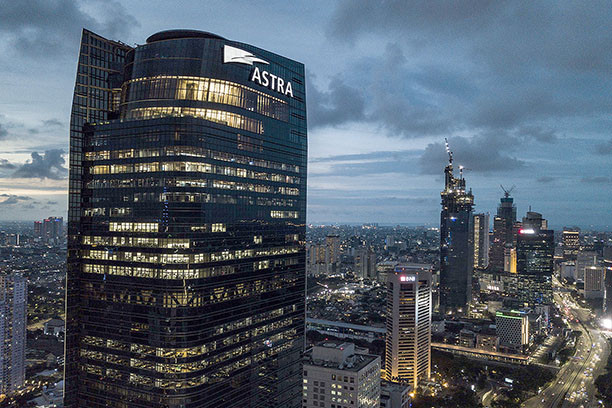Popular Reads
Top Results
Can't find what you're looking for?
View all search resultsPopular Reads
Top Results
Can't find what you're looking for?
View all search resultsAstra earnings fall 49% as automotive sees recovery in Q3 profit
While Southeast Asia's largest conglomerate has seen an overall decline in core earnings across all divisions, it may be looking to a new dawn in its automotive segment come the fourth quarter.
Change text size
Gift Premium Articles
to Anyone
D
iversified conglomerate PT Astra International has seen a significant decline in its revenue and net profit in the first nine months of the year as a result of the economic impacts of COVID-19 across all business segments. Most notably, its automotive segment has seen losses subside, while its property and agribusiness segments have made gains.
The company’s revenue fell 26 percent year-on-year (yoy) as of Sept. 30 to Rp 130.35 trillion, from the Rp 177.04 trillion it booked during the first nine months of 2019.
Its core net profit, which excluded the earnings it made from selling its shares in Bank Permata, declined 49 percent yoy to Rp 8.16 trillion. Including the earnings from the Bank Permata shares sale, Astra International recorded a 12 percent decline in net profit to Rp 14.04 trillion.
“Astra group’s overall performance during the first nine months of 2020 is lower [than] the same period last year, mainly as a result of the COVID-19 pandemic,” Astra International president director Djony Bunarto Tjondro said in a press release on Monday.
Djony noted that even so, the group’s third-quarter performance showed some improvement from the second quarter due to the easing of some coronavirus-related restrictions. However, the economic impacts of the health emergency would linger, he added.
“This pandemic, and the steps taken to contain its effects, is expected to continue for some time to come, and will still affect the group’s performance until the end of this year,” he said.
The Astra Group consolidates more than 235 subsidiary companies under seven business segments: automotive; financial services; heavy equipment, mining, construction and energy; agribusiness; infrastructure and logistics; information technology; and property.
Astra’s automotive business, which used to contribute the greatest earnings to the group, recorded the steepest fall on a yearly basis. It is now the third biggest contributor to Astra's net profits. An analyst has pointed out, however, that Astra’s automotive arm had improved significantly in its earnings on a quarterly basis.
“Astra International’s nine-month earnings this year is above our expectations, driven by recovery in its auto division,” equity analyst Andrey Wijaya of RHB Sekuritas Indonesia told The Jakarta Post on Tuesday by text message.
In a report RHB Sekuritas published on Tuesday, Andrey explained that Astra’s automotive segment booked positive third-quarter earnings of Rp 1.1 trillion to recover from its second-quarter losses of Rp 1.2 trillion. In terms of cumulative profit, the automotive segment had recorded a 70 percent yoy slump to Rp 1.8 trillion as of September.
“Improvements in production capacity after Jakarta’s partial lockdown in April [and] May helped Astra International regain its market share. Our new target for wholesale four-wheel [vehicles] in the 2020 fiscal year will likely be in line with the positive month-on-month pace at present to pave the way for more recovery ahead,” he said.
The automotive industry has been battered by the COVID-19 crisis as demand for new vehicles dwindled along with the decline in consumer buying power. According to the Association of Indonesian Automotive Manufacturers (Gaikindo), national sales of wholesale cars fell 50.73 percent yoy to 372,046 as of September.
Despite this, national car sales saw significantly higher sales in the third quarter compared to the second quarter. The industry sold 111,114 vehicles between July and September compared to 24,042 cars sold between April and June, a quarter-on-quarter (qoq) increase of 362.17 percent in sales volume.
Andrey told the Post that he expected to see the segment continue on its recovery path in the fourth quarter.
Meanwhile, the conglomerate saw four of its business segments contract. Its financial services segment contracted 36 percent yoy in net profit to Rp 2.76 trillion as of September, due to an increase in the provisions it had set aside to cover an increase in bad loans from consumers and heavy equipment financing businesses.
Astra’s heavy equipment, mining, construction and energy segment recorded a 40 percent decline in net profit to Rp 3.09 trillion. Net profit in its information technology segment was down 66 percent to Rp 26 trillion, while its infrastructure and logistics segment booked a net loss of Rp 59 trillion from a net profit of Rp 155 trillion in September 2019.
In contrast, Astra’s property and agribusiness segments grew significantly in the first nine months of the year, its property segment seeing a 110 percent increase in net profit to Rp 86 trillion. The agribusiness segment saw its net profit soar 421 percent to Rp 464 trillion, supported by a 26 percent yoy inflation in crude palm oil (CPO) prices.
In the RHB Sekuritas report, Andrey noted that Astra’s agribusiness segment saw an “impressive performance”, with its third-quarter net profit skyrocketing 850 percent qoq on the back of rising CPO prices.
“We believe [CPO] prices will continue to glide for a while, given weather disruptions that are likely limiting the availability of substitute products,” he said.
Shares in Astra International (ASII) were up 0.46 percent on Tuesday from the previous trading day, while the benchmark Jakarta Composite Index (JCI) was down 0.31 percent. The company’s shares have lost 21.66 percent of their value this year in line with the JCI’s year-to-date fall of 18.59 percent.










